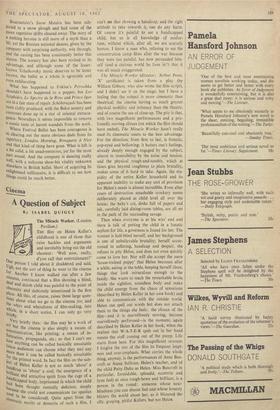A Question of Subject
By ISABEL QUIGLY
THE film on Helen Keller's childhood is one of those that raise hackles and arguments and inevitably bring out the old chestnut : 'Well now, really, d'you call that entertainment?' ?rue person I told about it shuddered and said, ugh, not the sort of thing he went to the cinema f0T. Another I know walked out after a few Minutes, convinced that a film showing a blind, tleaf and dumb child was painful to the point of °bscenitY and dubiously intentioned in the first place. All this, of course, raises those large ques- "us about what we go to the cinema for, and twilke. Whys and wherefores of film-making, into uleh, in a short notice, I can only go very oriefly.
VerY briefly then: the film may be a work of art but the cinema is also simply a means of (31111nunication, like printing; a means of in- .1urthation, propaganda, etc.; so that I can't see in? w anything can be called basically unsuitable "Itkee audiences can choose what they see) any. rElf °re than it can be called basically unsuitable icir the printed word. In fact the film on the sub- 'beet of Helen Keller is not so much 'about' a ka!i,dleaP as 'about' a soul, the emergence of a ruiant and attractive spirit from the cage of a had body, imprisoned in which the child 1)42 been thought mentally deficient, simply Sc she could not communicate (as spastics eised to be considered). Quite apart from the neniatie merits or demerits of such a film, I can't see that showing a handicap, and the right attitude to take towards it, can do any harm. Of course it's painful to see a handicapped child, but so is all knowledge of misfor- tune, without which, after all, we are scarcely human. I know a man who, refusing to see the concentration camp films after the war because they were too painful, has now persuaded him- self (and a curious world he lives in!) that it was all much exaggerated.
The Miracle Worker (director; Arthur Penn; 'X' certificate) is taken from a play (by William Gibson, who also wrote the film script), and I didn't see it on the stage; but I have a feeling that the subject is more cinematic than theatrical, the cinema having so much greater physical mobility and intimacy than the theatre, and of course the use of close-up. The pity is that, with two magnificent performances and a pro- foundly moving climax (on which the film should have ended), The Miracle Worker hasn't really used its cinematic assets to the best advantage. For the direction, from first to last, is frenetic, pop-eyed and bellowing; it batters one's feelings, already deeply enough engaged by the subject, almost to insensibility by the noise and tension, and the physical rough-and-tumble, which at times goes beyond toughness to plain brutality, makes some of it hard to take. Again, the stu- pidity of the entire Keller household and its apparent inability to make any sort of provision for Helen's needs is almost incredible. Even after years of destruction smashable crockery seems deliberately placed at child level all over the house; the baby's cot, desks full of papers and ink, carefully laid dining-room tables, are all set in the path of the marauding savage.
Then when everyone is at his wits' end and there is talk of putting the child in a lunatic asylum for life, a governess is found for her. The woman is half-blind herself, and her background is one of unbelievable brutality; herself accus- tomed to suffering, handicap and despair, she refuses to pity Helen, and does not even quickly come to love her. Nor will she accept the mere 'house-trained puppy' that Helen becomes after a while, eating at the table, keeping herself clean, things that look miraculous enough to the family. She wants to teach the remarkable brain inside the sightless, soundless body and make the child emerge from the chaos of sensations (described by Helen Keller in her own book) and able to communicate with the outside world. Helen can spell out words but does not attach them to the things she feels: the climax of the film—and it is marvellously moving, because marvellously performed—is the moment, again described by Helen Keller in her book, when she realises that W-A-T-E-R spelt out in her hand means the stuff coming out of the pump. Life starts from here. For this magnificent moment I forgive the rest of the film its frequent inept- ness and over-emphasis. What carries the whole thing, anyway, is the performances of Anne Ban- croft as Annie Sullivan, Helen's teacher, and of the child Patty Duke as Helen. Miss Bancroft in particular, formidable, splendid, eccentric and (you feel) at once rough-hewn and brilliant, is a person in the round: someone whose near- blindness you can almost feel and whose honesty blisters the world about her, as it blistered the silly, groping, pitiful Kellers, but not Helen.






























 Previous page
Previous page